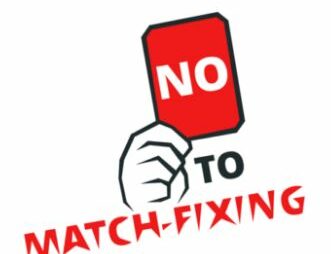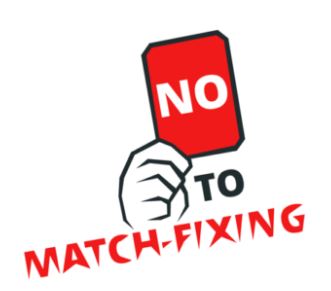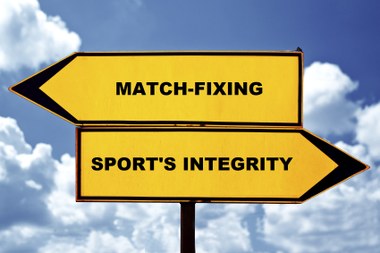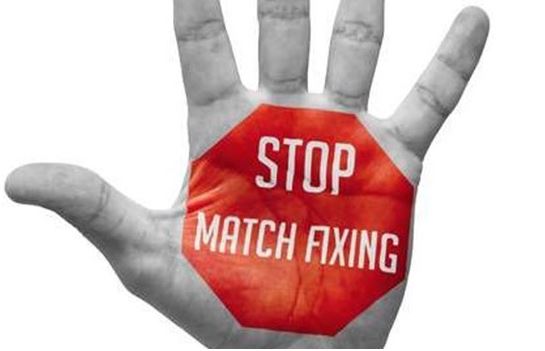Gambling is one of the main reasons why athletes receive match fixing proposals. Ironically, it is often the bookies who find out that something unreliable is going on
Almost 20% of the athletes received match fixing proposals


Match fixing proposals
Gambling is one of the main reasons for match fixing proposals. As long as bets exist as a form of entertainment, people try to cheat the system.
match fixing proposals are a worldwide problem and harmful phenomenon in the sports world. An international study, coordinated by Ghent University, investigated match fixing or match fixing in 7 European countries. Initial study results show that nearly 1 in 5 or 20% of over 5000 participants reported match-fixing proposals. More specifically, 18% of the participants personally identified one or more persons who had been approached. In addition, 8% of the participants indicated that they had already been approached for a match-fixing proposal.
“However, a clear distinction must be made between the different types of match fixing,” explains Van Der Hoeven.
Betting-related vs. sports related match fixing
Betting related match fixing
On the one hand, there is the betting-related type of match-fixing, where matches or specific events during matches are manipulated to earn money by betting on the manipulated match. Only 10% of the participants who had already been approached for match fixing indicated that the offer was made solely to make money by betting on the manipulated match during the last (or only) time they were approached. In most cases they received money and sometimes other material inducements to accept the proposal. Nearly 40% of them were also threatened or pressured to resolve the match. Ultimately, 36% agreed to the gambling-related proposal.
sports related match fixing
On the other hand, there is match fixing for sporting purposes, often referred to as ‘sport related match fixing’. Almost 70% of the participants approached indicated that the last or only time they were approached, the proposal had a sports-related purpose only. These persons were mainly approached to avoid relegation of a particular club or player or to enable a particular club or player to win the championship.
In this type of match fixing, the outcome of the match was at stake in more than 80% of the cases. In the majority of these cases, deliberate underperformance was expected and money was offered in about 50% of the cases, often supplemented by other material incentives. Nearly 20% of those who received a sports-related match-fixing proposal were also threatened or pressured. In the end, 27% agreed with the sports-related match fixing proposal. Agreeing to the sporting match-fixing proposal was mainly seen as a friendly gesture to another club or athlete. In other cases, people often agreed because of the money and / or other material incentives offered, or because they were pressured by their own team.
Despite the clear threat of sport-related match fixing, this type of match fixing is often underestimated and therefore neglected in prevention initiatives. “In a second phase, the EPOSM project will try to fill this gap by developing action plans and workshops on the prevention of match fixing in general and sports-related match fixing in particular,” adds Van Der Hoeven.
In addition, the EPOSM (“Evidence-based Prevention Of Sporting-related Match-fixing”) study also shows that 48% of people who reported direct or indirect match-fixing proposals never reported their suspicions or experiences to anyone. The people who had reported their suspicions or experiences with match fixing to someone, mainly did so to teammates, coaches or board members of their sports club. In a very limited number of cases, the crime was reported to an anonymous reporting line or to the police.
This may indicate that reporting channels are insufficiently known and / or that people are often afraid to report their suspicions or experiences with match fixing to someone. “In addition to awareness-raising initiatives, appropriate reporting channels and whistleblower protection programs are also important in preventing match-fixing,” concludes Van Der Hoeven.
Types of match fixing proposals
- (pool) hustling
Hustling is an English term used when someone tries to cover up their qualities in the hope of attracting a weak opponent. This form of deception is mainly associated with pool and formed the basis for the 1961 Paul Newman film The Hustler.
- race fixing
A specific form of match fixing in the event of a race. This applies to equestrian sports and motorsport, among others.
- salonremise
When two football teams take advantage of a draw and don’t go to extremes to win.
- spotfixing
It is not only possible to bet on the result of a sports match, but also on small parts of the sport that have little or no influence on the end result. For example, it is not only possible to bet on the result of a football match, but also on the number of yellow cards, the possession of a team, etc. Because spot fixing does not always change the outcome of a match, it is more difficult to resolve this form of deception. tracks.
Examples of match fixing proposals.
There are many examples of match fixing proposals – let’s take a look @ some
- Baseball hit an all-time low in 1919 when it came to light that eight members of the Chicago White Sox had been bribed for losing the World Series
- In 2005, the Zheyun Ye case came to light in Belgian football. Numerous football players (and coaches) had been bribed by the Chinese businessman Zheyun Ye (aka the gambling Chinese), who then made large sums of money by betting on these players’ matches. On March 16, 2006, the Belgian judicial authorities issued an international arrest warrant against him.
- Gang members bet on the tennis matches, where the profit was high, according to the OM. The Belgian Gaming Commission was tipped in 2015 by betting offices about Armenians without a clear income who were engaged in match fixing in tennis at the level of futures and challengers in Belgium. There, the prize money is between 5000 and 15,000 euros and there are usually no camera recordings.
Conclusion
Ironically, it is often the bookies who find out that something unreliable is going on when it comes to fixed matches. After all, companies don’t want to miss out on money, which is why advanced algorithms have been implemented to detect suspicious betting patterns. With experts suggesting that about 300 matches per season are ‘fixed’ in Europe’s biggest leagues, it’s important that they make good use of those algorithms.
The most reliable bookmakers in Belgium can be found here on this page
Game providers of Belgian legal online casinos and arcades
this list will be further expanded and you can play demo games from these game providers on our website
[excerptlist num=4 cat=’casino news’ ]
[casinobonustable num=5 type=’Casino’ orderby=’_as_rating’ sort=’desc’ ]
[excerptlist num=4 cat=’sports’ ]












